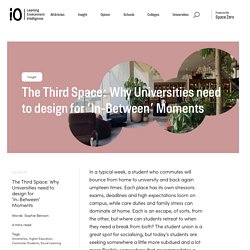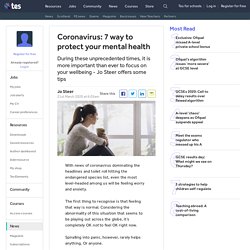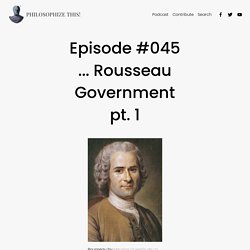

The Third Space: Why Universities need to design for ‘In-Between’ Moments - Inside Out. In a typical week, a student who commutes will bounce from home to university and back again umpteen times.

Each place has its own stressors: exams, deadlines and high expectations loom on campus, while care duties and family stress can dominate at home. Each is an escape, of sorts, from the other, but where can students retreat to when they need a break from both? The student union is a great spot for socialising, but today’s students are seeking somewhere a little more subdued and a lot more flexible; somewhere that accommodates a new style of learning and a new generation of commuters.
According to the Sutton Trust, a quarter of today’s students live at home and commute to study at university. In major cities the proportion is higher and at some universities, such as City, University of London and Newman University, commuter students are in the majority. Photograph: Patrick Chin In life outside of university, the third space might manifest as a barber shop or a book club. Dr Adam Fraser explains The Third Space. Why self-compassion – not self-esteem – leads to success - BBC Worklife. An evolving guide to practical Stoicism for the 21st century. Giving instead of taking - More than funny. Sir Ken Robinson: Finding Your Element. How To Fight Back Against Impostor Syndrome. Impostor Syndrome is one of the many challenges professionals confront and wrestle with daily, but don’t openly talk about.

It's a pernicious psychological phenomenon that makes you feel inadequate, like a fraud, undeserving of your position and that you don’t belong in the job you hold. There's incessant worry and fear that you’ll be found out, exposed and fired. It could wreak havoc on your emotional and mental well-being. You can become plagued by unrelenting ruminations, anxiety, stress and possibly depression. The cruel irony is that while you’re experiencing these harmful feelings, the reality is that you actually possess all of the right skills, experience, education, background and talents perfectly suited for the role. Extensive research has been conducted on this important matter. Having classifications doesn’t help you in your daily work-life.
Acknowledge Your Feelings The first thing you should do is acknowledge these feelings when they arise. Develop Coping Mechanisms. Summer Is For Sampling - Character Lab. I spend a lot of time studying women and men at the pinnacle of their fields.

The interest they take in their work is so intense as to border on obsession. As legendary football coach Bill Walsh described it, “you’re up at 3 a.m. every night talking into a tape recorder and writing notes on scraps of paper…” A lot of ambitious young adults I meet have no fear of a life like that. In fact, what they fear is the opposite: a kind of aimless wandering from one interest to another, always searching but never finding a home.
Likewise, many parents ask me for advice on how to get their kids to stick to one thing for years and years like the paragons of grit I study. Mindfulness for Wellbeing and Peak Performance. Coronavirus: How to protect your mental health. With news of coronavirus dominating the headlines and toilet roll hitting the endangered species list, even the most level-headed among us will be feeling worry and anxiety.

The first thing to recognise is that feeling that way is normal. Considering the abnormality of this situation that seems to be playing out across the globe, it’s completely OK not to feel OK right now. Spiralling into panic, however, rarely helps anything. Or anyone. So whether you’re still in school or teaching from home, the following steps will help you to remain realistic, resourceful and calm as we move through these uncharted waters: 1. Take a few minutes out, sit comfortably and close your eyes.
When your attention is pulled away, mentally note whether it’s by a thought or a feeling, and then whether it’s pleasant, unpleasant or neutral. I've lived as a man & a woman. Michael Norton: How to buy happiness. The Pursuit Of Happiness - Understandable, Obtainable, & Teachable. Robert Waldinger: What makes a good life? Lessons from the longest study on happiness. The Science of Well-Being by Yale University. Dan Gilbert: Why we make bad decisions. Dan Gilbert: The surprising science of happiness. To Do or to Have? That Is the Question.
Do experiences make people happier than material possessions? In two surveys, respondents from various demographic groups indicated that experiential purchases—those made with the primary intention of acquiring a life experience—made them happier than material purchases. In a follow-up laboratory experiment, participants experienced more positive feelings after pondering an experiential purchase than after pondering a material purchase. In another experiment, participants were more likely to anticipate that experiences would make them happier than material possessions after adopting a temporally distant, versus a temporally proximate, perspective. The discussion focuses on evidence that experiences make people happier because they are more open to positive reinterpretations, are a more meaningful part of one’s identity, and contribute more to successful social relationships. – frankreichert
Amazon. Prosocial Spending and Happiness: Using Money to Benefit Others Pays Off. Interview with Elizabeth Dunn - Stuff that Really Makes Us Happy. Article: Very Happy People - Ed Diener and Marty Seligman. Mihaly Csikszentmihalyi: Flow, the secret to happiness. No Mercy / No Malice. RSA Animate - Drive: The surprising truth about what motivates us. Go with your gut feeling.
Kjenner du disse fem hersketeknikkene? - Fagbladet.no. Philosophize This! <br/>Episode #045 ... Rousseau Government pt. 1 — Philosophize This! On this episode of the podcast, we examine the origins of government and discuss several opinions on how to construct the best system.
